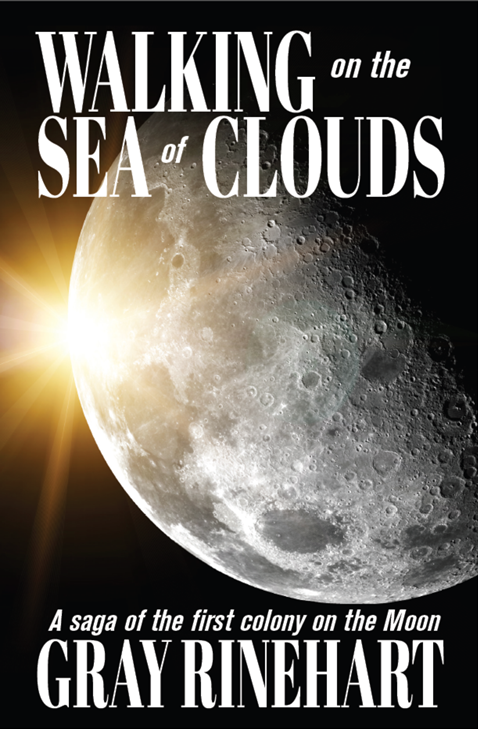I hope you enjoyed the last episode of Space Traipse: Hold My Beer, The Polarity Panic. I’m working on the next episode, Setting Roots, but in the meantime, I wanted to share with you the exiting news of my friend’s first novel!
Gray Rinehart is the only person to have commanded an Air Force satellite tracking station, written speeches for Presidential appointees, and had music on The Dr. Demento Show. I’m proud to call him a friend. His first novel, Walking on the Sea of Clouds, is out from WordFire Press.
“Annoyed you haven’t been to the Moon yet? Then pick up Walking on the Sea of Clouds; you’ll feel like you’re there.”
—Charles E. Gannon, author of the award-winning Caine Riordan series
ON THE LUNAR FRONTIER . . .
. . . survival and success require sacrifice.
. . . some sacrifices are greater than others.
. . . sometimes surviving is success enough.
Every frontier, every new world, tempts and tests the settlers who try to eke out an existence there. In
Walking on the Sea of Clouds, a few pioneering colonists struggle to overcome the unforgiving lunar environment as they work to establish the first independent, commercial colony on the “shore” of Mare Nubium, the “Sea of Clouds.” What will they sacrifice to succeed—and survive?
“This book will be treasured by anyone who has ever dreamt of visiting the Moon, walking on another world, or bathing beneath the light of a distant star.”
—David Farland, author of the NYT-bestselling Runelords novels
“Two things are immediately clear. First, Gray Rinehart knows his field(s) inside out; and second, he writes with grace, skill, and professional polish. What more could any reader ask?”
—Mike Resnick, multiple Hugo-award-winning author
Buy it on Amazon or Smashwords

Author Bio: (150 words or less)
Gray enjoyed a rather odd USAF career in which he fought rocket propellant fires, refurbished space launch facilities, “flew” satellites, drove trucks, processed nuclear command and control orders, and did other unusual things. Today, he is a contributing editor for Baen Books. His fiction has appeared in Analog Science Fiction & Fact, Asimov’s Science Fiction, Orson Scott Card’s Intergalactic Medicine Show, and several anthologies. Gray is also a singer/songwriter with two albums of mostly science-fiction-and-fantasy-inspired songs—the source of the aforementioned Dr. Demento appearances. His alter ego is the “Gray Man,” one of several famed ghosts of South Carolina’s Grand Strand, and his web site is graymanwrites.com.
Interview Questions:
What was the best part of writing this book for you?
That’s an interesting question! I suppose I could come at it either from a process standpoint or a product standpoint. I think from a process standpoint the best part was imagining what it might feel like and look like and smell like—what it might be like—to be on the Moon doing the things that I had my characters doing, and then to try to convey that so readers might find it realistic. That was the best part of the process because going into space has been a dream of mine ever since I was six years old, when I got hooked on Star Trek reruns.
Maybe that was the best part from a product standpoint, too, though. I got to dream it, and got to produce something of a written record of those dreams, even though I’ll never get to do those things I dreamed about.
What was the worst/hardest/most frustrating part for you?
Following up on how I answered the last question, trying to stay realistic was also the most frustrating part of putting this book together. Not so much in the scene-to-scene imagining of how it would feel, for instance, to do surveying on the Moon, or describing which way the shadows would fall when the crew is driving around, but in terms of the fact that establishing a lunar colony would be a monumental project and big undertakings are hard to portray in print.
Any big project in the real world takes a tremendous amount of time and requires a huge team of people—usually very specialized people, working simultaneously in many different areas. Large-scale projects usually also involve layers of bureaucracy and oversight, all of which would make for pretty tedious reading if we went into it in great depth and detail. Instead, I tried to allude to the details and keep them in the background while I concentrated on showing snippets of activity here and there—often responses to various emergencies, because emergencies have a way of attracting attention and I have some experience in that regard.
In the process of trying to portray the effort involved in this massive project, the action in the novel takes place in brief episodes spread over a long period of time—which is true to life, but doesn’t make for very rapid pacing. It was hard to keep the pacing consistent, and I consider that to be a limitation brought on by trying to keep everything realistic.
If you could be any character in the book, who would you be and why?
I think I would have to choose Van Richards. He’s not the primary character in the novel, but he’s important to the outcome and he has his own story. He’s a little more impulsive than I am, but I like to think that I could endure hardship with good humor the way he does. (People who know me might disagree, but that just shows why I’d like to be him.) Van maintains a positive attitude even when things aren’t going so well, and most especially he doesn’t take himself too seriously.
What inspired you to write this story in particular?
Wow, for this we have to go all the way back to my first duty station in the Air Force: Edwards AFB, at what was then known as the AF Rocket Propulsion Laboratory. That was a great assignment for someone interested in space systems!
I started off as Chief of Bioenvironmental Engineering at the rocket lab, and learned a great deal about rockets and propellants and test operations. I was also the Chief of the Disaster Response Force, and yes I was part of the recovery and cleanup of two rocket propellant fires. I eventually became the Deputy Director of Safety and Health and the System Safety Program Manager, so I had insight into almost every test program going on at the lab. A lot of things in the book were inspired by things I learned or experienced in that assignment, as well as other experiences I had in the service (not least being my remote tour in Greenland).
As for this story in particular: What impressed me the most in my career, and what I wanted my characters to portray, was the technical competence and professionalism of the people who build and maintain and operate these grand and complex systems. It occurred to me that a lot of stories revolve around commanders and directors, the people running the show and making big decisions, but when we get to building space stations and colonies there will be multitudes of people working on them and they all have their own parts in the adventure. Those larger endeavors won’t succeed with those people, and I wanted to tell some of their stories.
What’s next for you?
Conventions! I have several convention stops planned for the summer and into the fall.
In terms of writing, I recently finished outlining a new novel, a fantasy novel this time. I recently sent it to some industry folks to see if they think it tells a story worth pursuing. That story idea turned out to be a bit more epic in scope than I thought it was going to be, which I guess is good. I don’t consider myself to be a writer of epics—my stories tend to be smaller in scope and in scale—but this one has some interesting elements to it and it’ll be a challenge to write. Hopefully the folks with whom I shared the outline will agree that it’s a contender, in which case I expect that I’ll work on that for the rest of the year.
